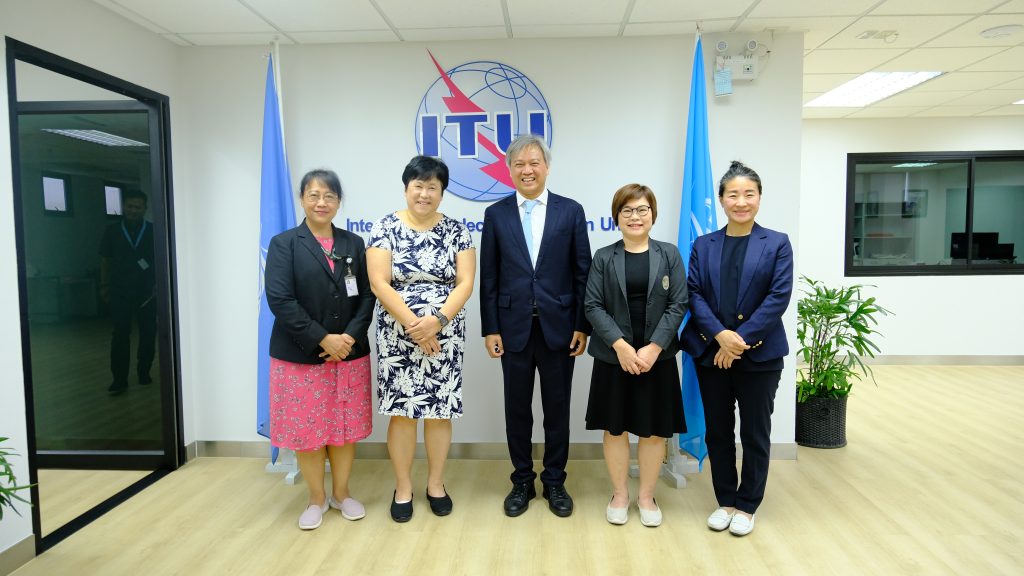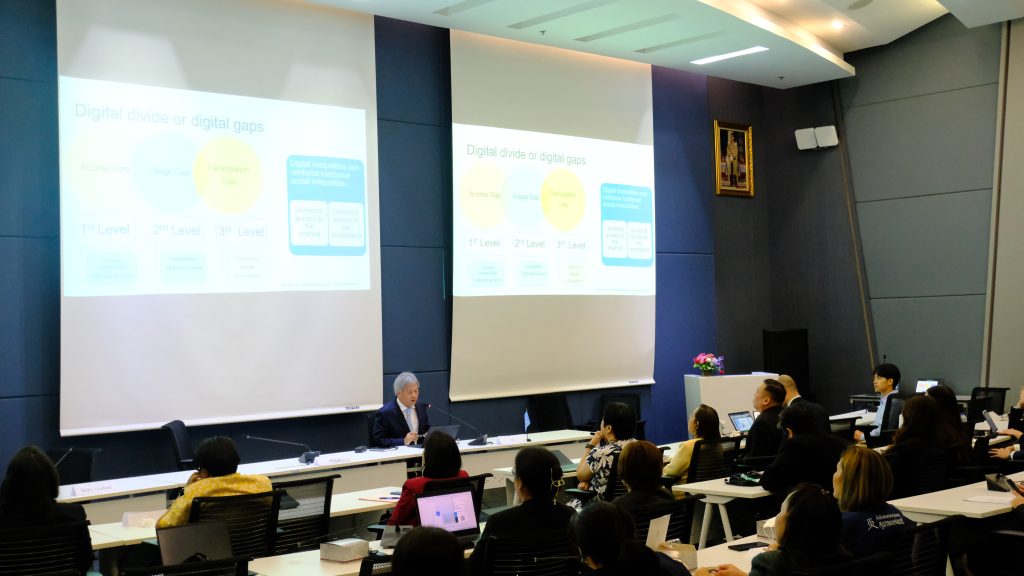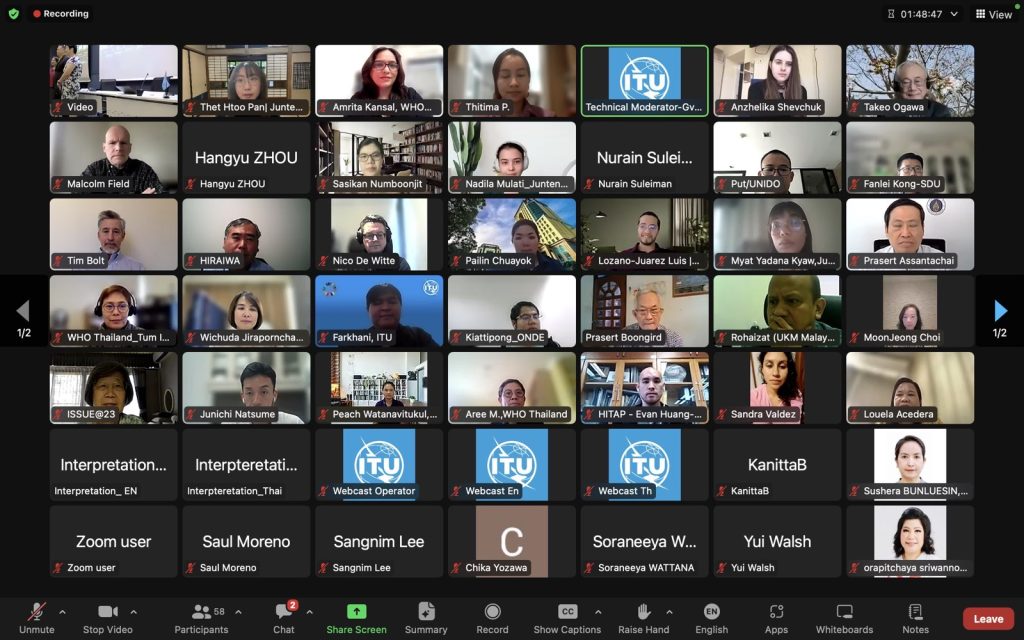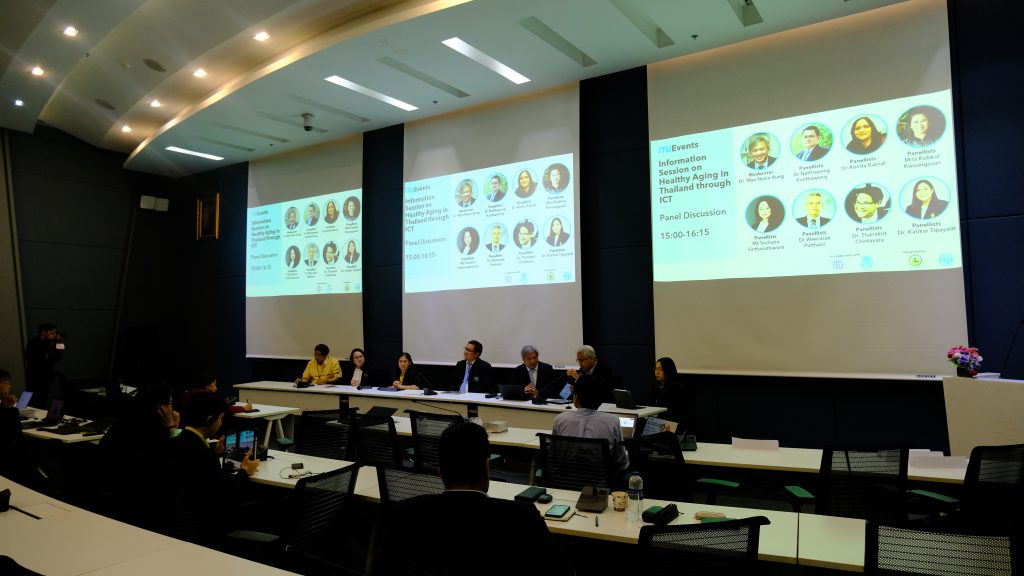Collaboration information session of ITU Regional Office for Asia and the Pacific with Digitally Inclusive, Healthy Ageing Communities (DIHAC) study team in Bangkok, Thailand
Principal Investigator of Digitally Inclusive Healthy Ageing Communities (DIHAC) study, Associate Professor Myo Nyein Aung, Department of Global Health Research, Graduate School of Medicine, and Faculty of International Liberal Arts, Juntendo University was invited to deliver Keynote lecture and moderate the panel discussion at the information session on “Healthy Aging in Thailand through ICT” hosted by International Telecommunication Union (ITU) Regional Office for Asia and the Pacific in collaboration with the Ministry of Digital Economy and Society (MDES) and World Health Organization Thailand (WHO) in Bangkok, Thailand on 1st April 2024. The session is an invitational event for UN agencies, Government agencies, Academic and Interested Organization.
Alongside with Associate Professor Dr. Myo Nyein Aung, Principal Investigator, DIHAC study team from Juntendo University comprising Lecturer Co-PI Dr. Yuka Koyanagi, PhD Juntendo University and Tokyo Ariake University, Dr. Saiyud Moolphate, MPH, PhD., Investigator, and adviser Thailand, Lecturer and Head of Department of Public Health, Chiang Mai Rajabhat University, Thailand, and Dr. Thin Nyein Nyein Aung, MBBS, MSc, PhD. DIHAC Thailand Team, Global Health Researcher, Department of Family Medicine, Faculty of Medicine, Chiang Mai University, Thailand participated in the on-site information session. Other DIHAC study investigators, advisers, members and collaborators joined via online.

Photo 1: DIHAC study Thailand and Japan teams with Ms. Atsuko Okuda, ITU Regional Director for Asia and the Pacific, at ITU office Bangkok 1.4.2024
A welcoming statement was made by Ms. Atsuko Okuda, ITU Regional Director for Asia and the Pacific, followed by Dr. Olivia Corazon Nieveras, Acting WHO Representative to Thailand, and Dr. Nattapon Nattasomboon, Deputy Permanent Secretary, Ministry of Digital Economy and Society (MDES).
Subsequently, DIHAC study PI Associate Professor Myo Nyein Aung addressed the demographic transition and ageing society, importance of digital inclusion in the healthy ageing decade in the context of Thailand’s ageing population. He explained why digital inclusion is becoming an important determinant of health, and sustainable quality of life for older people, and shared healthy ageing activities and programmes in different cultures. He shared ongoing policies and programmes to minimize the digital divide through the various facilitation programmes together with multi-national experiences and the preliminary findings from research “Digitally Inclusive Healthy Ageing Communities (DIHAC): a Cross-cultural Study in Japan, ROK, Singapore and Thailand” as well as recommendations for shaping future digitally inclusive society for older people in Thailand and the rest of the world.

Photo 2: Keynote Lecture of Associate Professor Myo Nyein Aung at the ITU auditorium, Bangkok
DIHAC study findings were announced for the first time in this information session. Dr Myo advocated to eliminate digital gaps among the older persons leading towards access equity, usage equity, consequently health equity and healthy ageing. He presented evidence from analysis of cross-cultural data.

Photo 3: International participants and DIHAC study team members at the ITU information Session in Zoom 1.4.2024
In the latter session, Associate Professor Myo Nyein Aung also served as a moderator for the Panel Discussion on “Strategies for Digital Inclusion – Healthy Aging in Thailand.” The panelists were (1) Dr. Natthapong Kunthawong, Director, the Bureau of Elderly Health, Department of Health, Ministry of Public Health, Ministry of Public Health (MOPH), (2) Dr. Amrita Kansal, Technical Officer (Healthy Ageing), WHO Regional Office for South-East Asia, (3) Ms. Kobkul Kwuangsuan, Ministry of Social Development and Human Security, (4) Ms. Suchana Sinthavathavorn, Vice President, Quality of Life and Security Development and Promotion Department, Digital Economy Promotion Agency (DEPA), (5) Dr.Thanakrit Chintavara, First Executive Vice President, Special Affairs Big Data Institute (BDI), (6) Dr. Weerasak Putthasri, Senior Advisor, The National Health Commission Office (NHCO), (7) Dr. Katikar Tipayalai, Lecturer, Chulalongkorn University. Delegates from respective ministries and organizations shared initiatives on digital inclusion of older persons. Strategies on closing the policy-implementation gap were actively discussed by the panelists.

Photo 4: Panel discussion at ITU auditorium, Bangkok
Information session and Panel discussion took place from 14:00 pm until 16:30 pm Thailand time. The event promised to be a valuable opportunity for professionals and policy makers leading to future collaborations. Ms. Atsuko Okuda acknowledged DIHAC study for important evidence and inputs that are very strategically useful for further development in digital inclusion and healthy ageing and expressed her thanks to all the panelists and moderator in the closing speech.
DIHAC study team and Department of Global Health Research, Juntendo University expressed sincere thanks to the Ms. Atsuko Okuda, Regional Director for Asia and the Pacific, International Telecommunication Union (ITU) and her team, stakeholders and policy makers, and DIHAC study collaborators around the world.
